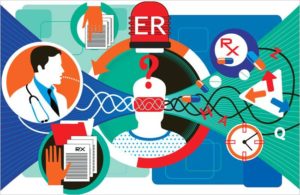Point-of-Care media must take responsibility for its trust and accountability because patient health depends on it.
 According to the CDC, American patients visited the doctor nearly 1 billion times in 2017 – over three trips per person. In many of those doctors’ offices across the United States, patients found educational materials to aid them in their heath care journey. In fact, Point-of-Care media reaches not only physicians’ offices and clinics but pharmacies and retailers, offering patients and their families valuable information at salient moments of diagnosis and treatment. Recent questions about the validity and transparency of Point-of-Care companies have challenged the efficacy of these programs and put this vital channel in jeopardy.
According to the CDC, American patients visited the doctor nearly 1 billion times in 2017 – over three trips per person. In many of those doctors’ offices across the United States, patients found educational materials to aid them in their heath care journey. In fact, Point-of-Care media reaches not only physicians’ offices and clinics but pharmacies and retailers, offering patients and their families valuable information at salient moments of diagnosis and treatment. Recent questions about the validity and transparency of Point-of-Care companies have challenged the efficacy of these programs and put this vital channel in jeopardy.
Since its inception, Point-of-Care has aimed to provide equitable access for patients, caregivers, and consumers to find valuable resources in a wide array of locations. This information is frequently provided free of charge and often accompanied by sponsor messages. Accompanying these resources, advertisers gain premium access to key consumer groups in targeted, turnkey settings. Consequently, it is imperative that this media channel be held to the same standards as any other mainstream channel. Trust and credibility are key attributes for brands and agencies to feel confident that precious advertising dollars are put to good use. Without this confidence, marketers have no choice but to seek other locations for their campaigns, and the Point-of-Care channel will be lost. Such action would be devastating for the industry, but even more impactful for those it serves.
Patients are struggling like never before. Faced with complex insurance requirements, ever-changing government health policies, and rising costs, consumers in the waiting rooms and pharmacies have more questions than any prior generation. To make matters worse, the well-being of the population in the United States continues to decline, driving additional people into the healthcare system and increased overall strain. The tales of overworked physicians, exasperated patients, and a structure in peril have been well documented. The healthcare journey can now feel more like a frontier expedition, riddled with anxiety, uncertainty, and fear.
While Point-of-Care media can’t eliminate all of those emotions, its role in educating patients can create systemic benefits that can ease stress on the entire process. With access to a wide array of print and digital-based resources, patients can become more knowledgeable about symptoms and disease states and learn about appropriate treatments that may be available. With this knowledge, doctor-patient conversations can be more targeted and efficient, focusing the physician’s limited time on the most pressing concerns for the patient. Information is then available at home for reinforcement, boosting the prospects of adherence, and pharmacies can act as valuable outposts to complement patient care. Equally important, caregivers can find invaluable resources to maintain the health of loved ones.
 Patient education is a crucial step to improve patient outcomes. But in order to take advantage of those benefits, the industry must require accountability for those who work within this domain. Educational resources must have value for the intended audience and provide information in a clear, responsible manner. As such, that information must be distributed according to a strategic, thoughtful plan. The availability and targeting of assets purchased by marketing partners must be achieved and validated with full compliance.
Patient education is a crucial step to improve patient outcomes. But in order to take advantage of those benefits, the industry must require accountability for those who work within this domain. Educational resources must have value for the intended audience and provide information in a clear, responsible manner. As such, that information must be distributed according to a strategic, thoughtful plan. The availability and targeting of assets purchased by marketing partners must be achieved and validated with full compliance.
Sponsors deserve the trust and credibility that should come with any other purchase. Programs must be sold and executed as promised, with proof of performance. Point-of-Care must establish clear standards that match those of other media channels, such as television, radio, or outdoor advertising.
Different from those channels, however, is that failure to provide such credibility at Point-of-Care would deprive patients of critical information when they need it most. It is incumbent upon the Point-of-Care industry to improve its standard of excellence and demand accountability from within. Patient’s lives depend on it.


No comments yet.